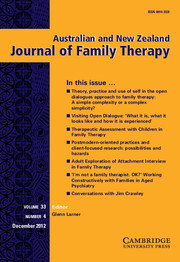Article contents
Cut the Crap: Language — Risks and Relationships in Systemic Therapy and Supervision
Published online by Cambridge University Press: 21 February 2012
Abstract
This article concerns the use of language in both therapy and supervision, and how it contributes to the necessary risk-taking that will be a part of therapists' and supervisors' repertoires. The focus will be on my own examples in both roles, and will refer to both successes and failures, while questioning the usefulness of either concept. Within a postmodern paradigm, and influenced by thinkers including Foucault and Bakhtin as well as systemic clinicians, I will examine the use of language (including in cross-cultural settings where risks can sometimes be amplified) and of humour and self while exploring the meanings of identity. I contend that all relationships contain some element of risk and the ways in which we create a safe enough context, through the uses of language as well as nonlinguistic means, are the crucial elements in our endeavours as supervisors and therapists. I favour the idea that therapy is more of an art than a science and that this is most exemplified in the graceful use of language by which we strive to engage rather than alienate people. The article may be considered by some as being useful advice, and by others as a risk too far, such is the controversial nature of language, which highlights the importance of relationships and context.
- Type
- Articles
- Information
- Australian and New Zealand Journal of Family Therapy , Volume 32 , Issue 1 , 01 March 2011 , pp. 58 - 69
- Copyright
- Copyright © Cambridge University Press 2011
- 3
- Cited by




